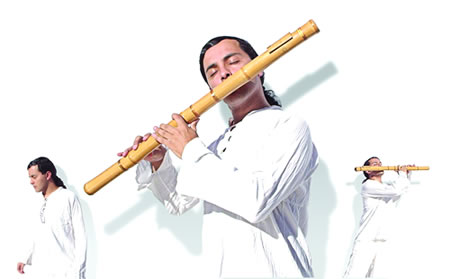
World Flutes Master

Take care of our enviroment

comprar

Peace web theme set courtesy of Crystal Cloud Graphics web set icon
Crystal Cloud Graphics
Crystal Cloud Graphics


Mijwiz
The mijwiz is a traditional musical instrument of ancient Egypt and the Levant. Its name in Arabic means "dual," or "married" because of its consisting of two, short, bamboo reed pipes put together, making the mijwiz a double-pipe, single-reed woodwind instrument. The mijwiz consists of two pipes of equal length, between 6 and 8 centimeters; each pipe has around five or six small holes for fingering. It requires a special technique of playing known as "circular breathing," and can only be done by trained musicians. The mijwiz is played in Egypt and the Levant as an accompaniment to either belly dancing or dabke, the folkloric line dance of the Levant. Although Egyptian in origin, the mijwiz is most popular today in the Levant (Lebanon, Palestine, and Syria). Many popular folk songs either include the mijwiz on recordings, or include the instrument's name in the song's lyrics.
The mijwiz is a traditional musical instrument of ancient Egypt and the Levant. Its name in Arabic means "dual," or "married" because of its consisting of two, short, bamboo reed pipes put together, making the mijwiz a double-pipe, single-reed woodwind instrument. The mijwiz consists of two pipes of equal length, between 6 and 8 centimeters; each pipe has around five or six small holes for fingering. It requires a special technique of playing known as "circular breathing," and can only be done by trained musicians. The mijwiz is played in Egypt and the Levant as an accompaniment to either belly dancing or dabke, the folkloric line dance of the Levant. Although Egyptian in origin, the mijwiz is most popular today in the Levant (Lebanon, Palestine, and Syria). Many popular folk songs either include the mijwiz on recordings, or include the instrument's name in the song's lyrics.









